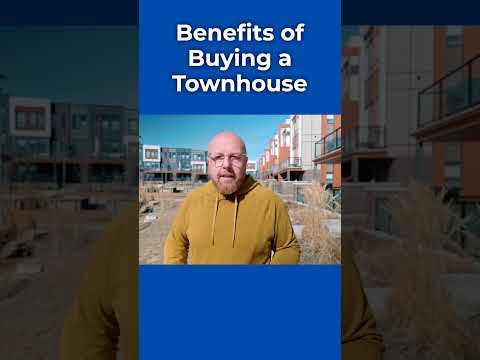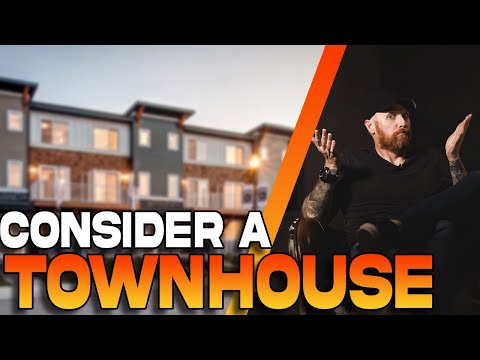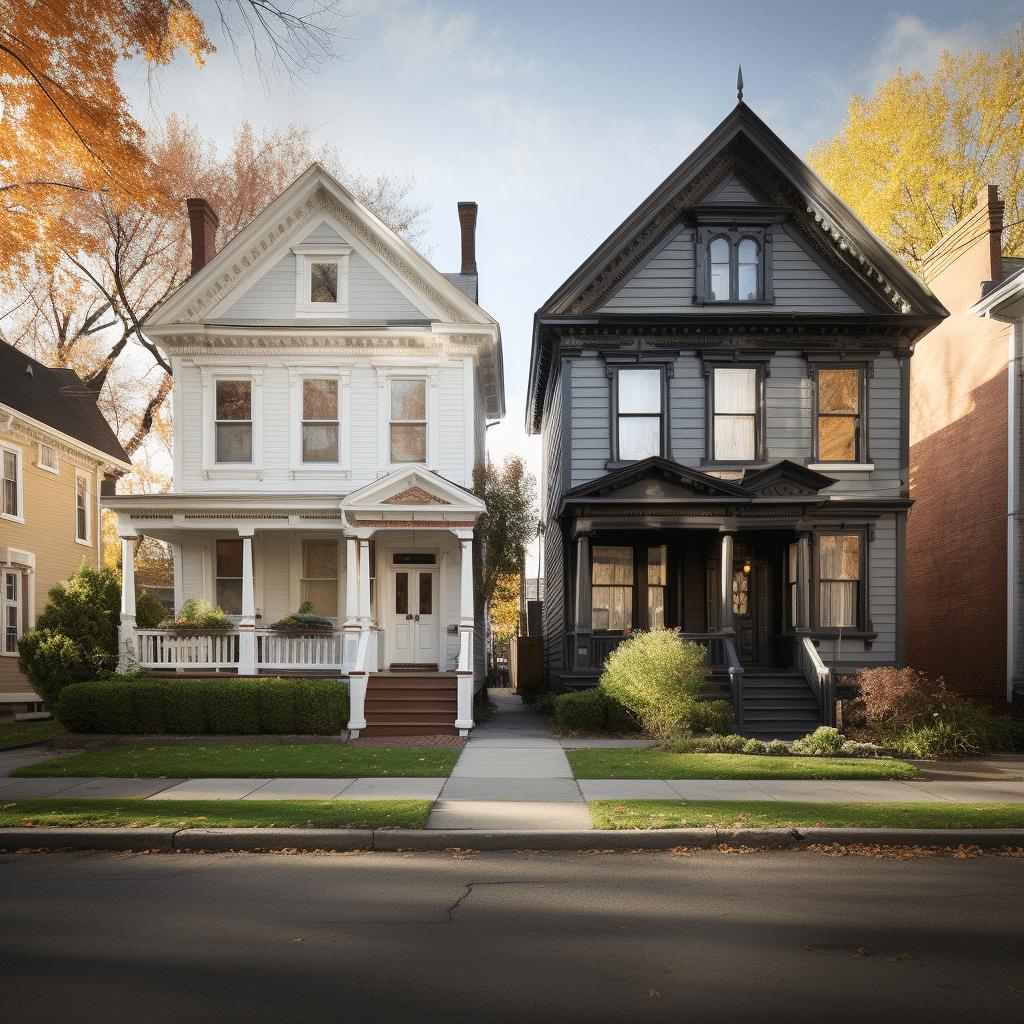Peeling Back the Layers: House vs Townhouse
If we set our sights on the housing decided, have you ever given a thought to the classic conundrum of the house vs townhouse? A house often visualized as a standalone unit, with bountiful open spaces and perhaps a whiff of coziness that warmth of familial living emanates. A townhouse, on the other hand, carries the image of a row of identical homes sharing walls, compactly making up for a suave, modern neighborhood.
Distinct, yes, but every coin has two sides. Before hopping onto any bandwagon, let’s venture into the underlying essence of these dwellings. Buckle up!

Characteristics of a House vs Townhouse: The Fundamental Differences
Here comes the crunch: understanding how structure, size, and design set apart a house and townhouse.
Structural Integrity: Townhouse vs Duplex
There’s a catch: the terms townhouse and duplex are often interchanged, albeit incorrectly. A duplex is a single building split into two separate dwellings, vertically or horizontally. On the flip end, a townhouse is characterized by multiple independent units attached side by side, much like a slice from a row of dominoes. Townhouses, with their narrow, multi-storied stature, and shared walls, encompass you within a close-knit community feel of modern conveniences.
Property Variations: Townhouse vs House
The single-family home, or the house, presents a stark contrast. Coming with a standalone structure, often settled on a handy piece of land, it’s the beacon of individuality. Your solitude is just at arm’s length, with no shared walls or close neighbors. You see, the underlying difference between townhouse vs house often boils down to the extent of connection and space that you crave.

| Topic | House | Townhouse |
|---|---|---|
| Size | Houses are typically larger than townhouses, offering more square footage. | Townhouses are usually smaller and narrower than houses. |
| Structure | Single-family homes are freestanding and typically placed on independent plots of land. | Townhouses are attached to each other, with each unit sharing one or more walls with its neighbors. Each unit has its own entrance and may have a small front yard and backyard. |
| Community/Location | Houses are typically located in a variety of settings, from urban neighborhoods to rural areas, but may not be part of a communal setting. | Townhouses are often built as part of gated communities or neighborhoods, offering shared amenities and close proximity to neighbors. |
| Affordability | Owning a house generally involves higher property taxes due to larger lot size. | Due to smaller lot size, townhome residents generally pay lower property taxes and homeowners association fees are usually lower compared to condos. |
| Ownership | When you buy a house, you also typically own the land it’s on. | Owning a townhouse is similar to owning a detached single family home, but you share the building structure with your neighbors. |
| Privacy | Houses can offer more privacy as they are freestanding and usually have their property. | Privacy can be limited in townhouses due to the shared exterior walls and close proximity to neighbors. |
| Freedom of Home Appearance | Have the freedom to customize or renovate as desired as long as it adheres to local laws and regulations. | You may have less freedom about your home’s appearance due to homeowners association rules and the shared structure. |
| Homeowners Association (HOA) | Houses may or may not be part of a homeowners association. | Townhouses are usually part of a homeowners association, which can mean shared amenities but also possible restrictions. |
Fact 1: Size Matters: House vs Townhouse
Measuring up these two properties, it’s evident that size plays a lead role in the house vs townhouse dilemma. Houses generally boast larger dimensions and yard space, often making them a prime pick for larger families or those coveting expansive open areas. Got a knack for landscaping or growing your own veggies? Houses provide you with that elbow room!
Townhouses, although smaller and thinner, strategically utilize space with their multi-storied design. The compact nature not only provides a cozy setting but also adds an ease of management. After all, there’s less square footage to maintain or clean. Ever wished for hairstyles trimmed with sleek precision, much like a low fade haircut? A townhouse might be your stylish fit in the real estate space!

Fact 2: Community Layout: Defining the Townhouse Life
A townhouse is to a housing community as a chapter is to its book. With shared walls and often communal spaces like pool and parks, townhouses foster a community layout, making your neighbors feel more like extended family members. Residents engage more frequently, sharing common events or even a simple, friendly chat on a Sunday afternoon.

Fact 3: Unearthing the Perks: Advantage’s of a Townhouse
The townhouse serves up a platter of benefits. It’s got affordability in its pocket. Lower purchase prices and economical upkeep fall right into the budget-conscious alley of many a prospective homeowner. Moreover, Hoas ensure maintenance tasks like external repairs, snow removal, or even lawn care fall under communal responsibilities. Not to forget shared amenities like a fitness center or swimming pool – think of them as cherries on top!
Townhouses also promote closer proximity to neighbors. Do you yearn for that lost sense of nearness in today’s busy world? Well, the townhouse lifestyle, with its shared walls and common spaces could be just the ticket for you!

Fact 4: The Downside: Discerning the Cons of Townhouse Living
On the flipside, there’s some wrinkle to wash away. Lesser square footage and lesser freedom with your home’s appearance might be sticking points. If you fancy a dappling of creative hues on your exterior walls or a radically upbeat landscaping style, hold your horses! The HOA holds some control over the cohesive aesthetic of the community.
Ding-dong! Ready to welcome surprise guests at any hour thanks to the reduced privacy? Perhaps not, eh? It’s akin to running a Samsung washer And dryer simultaneously on a peaceful afternoon.

Fact 5: Financial Implications: Property Taxes and HOA Fees Comparison
The finance bug bites! Both housing types come with associated costs. But, let’s level the tales of balance. Due to smaller lot sizes, townhouses usually promise lower property taxes. Add to it lower HOA fees compared to the premium counterparts (think condominiums). Suddenly, it’s not as fundamental a blow to your wallet, is it?
However, with a house, you strike off HOA fees entirely. Plus, you’re free to make modifications or renovations that could significantly increase the value of your abode. Weighing the house vs townhouse scene on scales of financial planning offers quite a spectacle!
Fact 6: Ownership Derivatives: Townhouses vs Houses
Titles – they matter. Akin to a house, townhouse ownership extends beyond the front door. You own the interior, exterior, driveway, even the slice of land it perches upon. A homeowner could finance the house or make an upfront payment in cash. With a house, the sense of ownership tends to catalyze more freedom and customization.
Contrary to popular belief, Owning a Townhouse is very much like owning a single-detached house. You’re the boss!
Facts 7-10: Urban Dynamics: From City Dwellings to Suburban Homes
An urban setting, an epitome of convenience, is where townhouses usually fit in best. Close to schools, offices, malls, this city dwelling concept offers impressive location advantages.
But how often do you find houses in the middle of the city? Rarely! They make their mark better in quieter suburban spaces, aren’t they? Maybe you’d value the tranquility and space over convenience?
Both townhouses and houses come with perks of having lawns and entrances, although ticked differently on the scale of magnitude. A townhouse often flaunts a small front lawn and a backyard. In contrast, houses generally come with significantly larger outdoor spaces. Entrances are private in each case, with townhouses sometimes making do with shared driveways.
Dwelling Decisions: Picking Your Perfect Place
The final whistle blows! Choosing between a house and a townhouse isn’t just a numbers game. Instead, it’s a thoughtfully curated decision that pivots around your lifestyle, budget, space needs, and community preferences.
Perhaps you yearn for a simpler life in a close-knit neighborhood where convenience, affordability, and shared amenities are at your doorstep – a townhouse suits you well then! If, however, you cherish privacy, crave spaciousness or have green fingers itching for a vast lawn, investing in a house would make more sense.
In the end, the house vs townhouse debate has no clear, one-size-fits-all answer. It’s a maze where different paths take different travelers to their destined abode. So, pop the big question – what’s your pick?
What is difference between townhouse and house?
Well, when it comes to the difference between a townhouse and a house, it’s all about the layout and ownership. A house is a standalone structure that you own inside and out, including the land it sits on. On the flipside, a townhouse is a unit in a row of similar houses that share walls with neighbors on either side. You own the interior and exterior of your unit, but not the shared walls, and the land is commonly owned.
What are the disadvantages of a townhouse?
The downside of a townhouse? Well, howdy neighbor! Living so close to your neighbors can limit your privacy. Plus, you usually have to abide by a homeowner’s association (HOA) rules, which can be a bit of a stick in the mud if you like to march to the beat of your own drum.
What are the benefits of owning a townhouse vs house?
On the bright side, owning a townhouse vs. a house can help you lighten the load. Less square footage means less space to clean and maintain compared to a larger house. Also, many townhouse communities offer amenities like a community pool or gym, which can make your life more peachy-keen!
What makes a townhouse different?
A townhouse is different because it blends elements of condos and single-family homes. Just like Goldilocks, you’ll find it right in the middle – not too detached, not too attached!
What are the benefits of living in a townhouse?
Living in a townhouse has its perks. For one, you often get a lawn and possibly a small garden without the fuss of maintaining a large backyard. On top of that, common areas and amenities are usually taken care of by the HOA, leaving you more time to kick back and relax!
Why do they call it a townhouse?
Why do they call it a townhouse? The term “townhouse” originated in the UK and was used to describe the town or city residences of the nobility. These homes were typically in close proximity to each other in urban areas – hence, a “house in town”.
What are the pros and cons of owning a duplex?
Owning a duplex can be a mixed bag. Pros include possible rental income and fewer neighbors. At the same time, cons include potential landlord responsibilities and less privacy than a single-family home.
What are the disadvantages of row houses?
Row houses, like anything else, have their pros and cons. One downside is limited natural light, especially in middle units, as windows are typically just on the front and back of the home. Also, you’ve got common walls, so thin walls can mean noise from neighboring units.
What are the disadvantages of living in a condo?
One of the big downsides of living in a condo is that you’re subject to the rules and fees of a condo association. You may have limited control over your space – sometimes it’s like, “Hold on a darn minute, I own this place, don’t I?”
What is the difference between a duplex and a townhouse?
Duplex vs. townhouse? Well, it’s like comparing apples and oranges. A duplex is a single building divided into two separate living units, each with its own entrance. A townhouse, on the other hand, is a style of housing where individual units share walls with others in the row.
What is it like to live in a duplex?
Want to know what life in a duplex is like? Imagine sharing a wall with another family or individual. It’s a bit like apartment living, but generally, with more space and fewer neighbors.
What is the difference between an apartment and a condo?
The difference between an apartment and a condo? It boils down to ownership. You rent an apartment, but you buy a condo. As far as the living arrangement goes, they’re pretty much the same.
Is a townhouse always 2 stories?
A townhouse always 2 stories? Nope, not always! While many are 2 stories, they can range from one to four stories depending on the design and location.
Are townhouses bigger than houses?
Are townhouses bigger than houses? Not usually, no. Because they share walls and common areas, townhouses are typically smaller than detached houses.
What do a townhouse look like?
What does a townhouse look like? It’s a row of identical or similar looking homes sharing one or two walls. They have their own entrances and often feature two stories, but can vary in design and layout.
Are townhouses bigger than houses?
Are townhouses bigger than houses? Oops, we’ve been here before! As I said earlier, townhouses are typically smaller than detached houses.
What is the difference between a townhome and a single-family attached home?
The key difference between a townhouse and a single-family attached home? The latter shares a wall with another dwelling but sits on its own parcel of land. Townhomes, on the other hand, are part of a larger community with shared common space.
Do townhomes have good resale value?
Does a townhome have good resale value? Often, yes! It can be a fantastic investment, especially if it’s in an up-and-coming area. Though, keep in mind this depends on many factors, including the housing market and the home’s location.
What is the difference between a duplex and a townhouse?
Getting confused between a duplex and a townhouse again? Well, a duplex is a single house with two separate units, while a townhouse is usually one of many similar units all connected in a row or block. There you have it!



